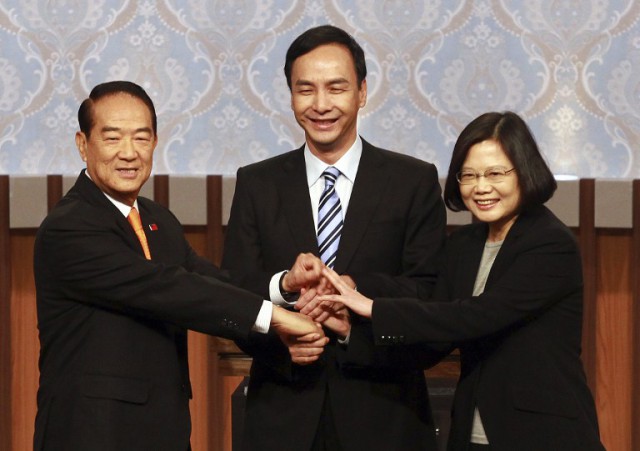
The three candidates running for President of the Republic of China are: James Soong from the People First Party (PFP) (L), Eric Chu from the ruling Kuomintang (KMT) party (Center), and Tsai Ing-wen from the Democratic Progressive Party (DPP) (R).
Taiwan’s three presidential candidates, appearing in a nationwide debate on Sunday, promised to deliver improved High Speed Internet in the Republic of China, with some candidates committing to give broadband away for free to low and middle-income families.
Taiwan is making broadband expansion and improvement a top national priority, as the country races towards delivering gigabit wired broadband and 5G wireless service. The government wants to boost the country’s broadband ranking, now 33rd in the world.
Bringing speeds up while reducing broadband bills is the goal of Eric Chu, the candidate from the ruling Kuomintang (KMT) party. During his terms as leader of New Taipei and Taoyuan County, Chu presided over a major expansion of Internet penetration rates. Chu believes the next step is to make broadband service free of charge for low/middle-income residents and deliver nationwide free Wi-Fi to every centimeter of Taiwan.
Internet providers would still profit from selling faster access to customers willing to pay for it, but Chu’s policies continue a theme that broadband access is a basic human right, a position increasingly popular in the country. Voters appeared skeptical of Chu’s claims, however, because the KMT has garnered a reputation of being in bed with big business during its last two terms in office. But that has not stopped Chu from criticizing telecom executives for not doing more to invest and eventually offer next generation 5G wireless service in Taiwan.
James Soong, from the People First Party — considered to have a close (but frequently tense) alliance with the KMT — predictably agreed with Chu, but also wants Taiwan to do more to protect Internet privacy and online safety. Soong wants to completely scrap the country’s legacy copper wire telecommunications infrastructure and replace it with fiber optics, delivering fiber service to every home and business in Taiwan. With a fiber upgrade, Soong is convinced Taiwan will achieve his goal of top-10 broadband status.
Tsai Ing-wen from the Democratic Progressive Party (DPP) said when private companies don’t deliver, it is government’s responsibility to address the digital divide, by making high quality service affordable and fast. Taiwan’s telecom companies are paying close attention to the DPP candidate because polls make her the favorite to become the next president of Taiwan, after the election on Jan. 16.
“The use of broadband Internet service should be part of the people’s basic human rights,” she said. “It is also important to narrow the digital divide to improve educational opportunities for children in remote areas and develop children’s digital capabilities.”
With broadband being treated as a high priority issue in the presidential race, Taiwan’s largest broadband provider, Chunghwa Telecom – 中華電信, has announced the first commercial deployments of G.fast technology – the newest generation of DSL – across Taiwan.
Israeli chipmaker Sckipio demonstrated G.Fast technology at CES 2016 in Las Vegas this week, claiming it is faster than traditional DSL and cable broadband. In a limited demonstration, the company demonstrated download speeds achieving 750Mbps over traditional copper wire networks, about 50 times faster than average broadband speeds. Sckipio promised G.Fast technology will debut in the United States later this year.


 Subscribe
Subscribe
G.Fast is only stop gap measure to what the U.S. telcos really need to do. I do hope that it does come. We need it.
I’m not an expert, but G.Fast seems to make sense only in normal countries like Taiwan (political circumstances aside) where people live in dense MDU high-rise apartments. In the US, we live in single family houses as far from our neighbor and the city as possible, and essentially demand sewage/electrical/telecom be built out to reach us (until the municipality defaults on its bonds when property values tank in the exurbs, and infrastructure starts crumbling). So long as the electrical utility and last mile ISPs are different entities (and especially if power production and distribution costs something), “free” isn’t going to… Read more »